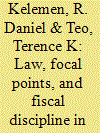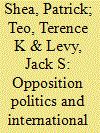| Srl | Item |
| 1 |
ID:
133026


|
|
|
|
|
| Publication |
2014.
|
| Summary/Abstract |
Many studies suggest that strict balanced budget rules can restrain sovereign debt and lower sovereign borrowing costs, even if those rules are never enforced in court. Why might public officials adhere to a rule that is practically never enforced in court? Existing literature points to a legal deterrence logic in which the threat of judicial enforcement deters sovereigns from violating the rules in the first place. By contrast, we argue that balanced budget rules work by coordinating decentralized punishment of sovereigns by bond markets, rather than by posing a credible threat of judicial enforcement. Therefore, the clarity of the focal point provided by the rule, rather than the strength of its judicial enforcement mechanisms, determines its effectiveness. We develop a formal model that captures the logic of our argument, and we assess this model using data on U.S. states. We then consider implications of our argument for the impact of the balanced budget rules recently imposed on eurozone states in the Fiscal Compact Treaty.
|
|
|
|
|
|
|
|
|
|
|
|
|
|
|
|
| 2 |
ID:
136609


|
|
|
|
|
| Summary/Abstract |
Democratic foreign policy choices are a function of expected international outcomes and the preferences, power, and information of domestic actors. Studies of domestic political competition and international crisis bargaining have argued that an opposition's policy positions send credible signals of the government's intentions to adversarial target states. This paper contends that while opposition behavior may send informative signals, it can also directly constrain the policy options of the government. We relax previous assumptions that the opposition cannot directly prevent war or influence the outcomes of war (Schultz 2001). Instead, we assume that the opposition controls some political resources and attempts to influence the government's policy decisions in a way that advances its own partisan interests. To empirically demonstrate the theoretical differences in our model in comparison with previous domestic opposition models, we examine the case of the Quasi-War of 1798 between the United States and France.
|
|
|
|
|
|
|
|
|
|
|
|
|
|
|
|